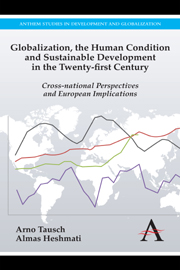 Globalization, the Human Condition and Sustainable Development in the Twenty-First Century
Globalization, the Human Condition and Sustainable Development in the Twenty-First Century Book contents
- Frontmatter
- Contents
- Miscellaneous frontmatter
- List of Abbreviations
- Glossary of Key Terms
- Foreword
- Preface
- 1 Should the Musicians Continue to Play?
- 2 Background
- 3 Methods
- 4 Cross-national Results: Beyond the Pro-globalist Development Approach of the European Commission
- 5 Final Cross-national Results for the Combined Development Indicator
- 6 A Time Series Perspective on Globalization, Growth and Inequality
- 7 Conclusions
- Appendices
- References
- Index of Persons and Authorships
- Index of Subjects and Countries
Preface
Published online by Cambridge University Press: 05 July 2012
- Frontmatter
- Contents
- Miscellaneous frontmatter
- List of Abbreviations
- Glossary of Key Terms
- Foreword
- Preface
- 1 Should the Musicians Continue to Play?
- 2 Background
- 3 Methods
- 4 Cross-national Results: Beyond the Pro-globalist Development Approach of the European Commission
- 5 Final Cross-national Results for the Combined Development Indicator
- 6 A Time Series Perspective on Globalization, Growth and Inequality
- 7 Conclusions
- Appendices
- References
- Index of Persons and Authorships
- Index of Subjects and Countries
Summary
The present book is a quantitative study of world development in both space and time. In space, for we study contemporary global development since the end of communism in Central Eastern Europe and the former USSR in up to 175 nations, using 26 predictor variables to evaluate the determinants of 35 processes of development on a global scale. In time, because we study the logic of global world economic trends at the level of the world system for the last four decades with a time series analysis of inequality and globalization.
Our study has clear implications for the study of global development; but it is also clear that it has many politically highly controversial implications for current debates about the future of Europe in the global economy. Presented with signs of failure and decay all around, European decision makers should start finally to take serious lessons on why some countries in the world system develop better than others. We severely criticize the hitherto existing pro-globalization strategy of the European Commission, and maintain that it is to be held responsible for the failure of the attempt to make Europe the world's leading economy by 2010, the so-called Lisbon Strategy. To judge from the results of this study, the successor strategy (the so-called EU-2020 strategy) will also fail, just like the Lisbon Strategy 2010.
- Type
- Chapter
- Information
- Globalization, the Human Condition and Sustainable Development in the Twenty-First CenturyCross-National Perspectives and European Implications, pp. xxxix - xlivPublisher: Anthem PressPrint publication year: 2012
